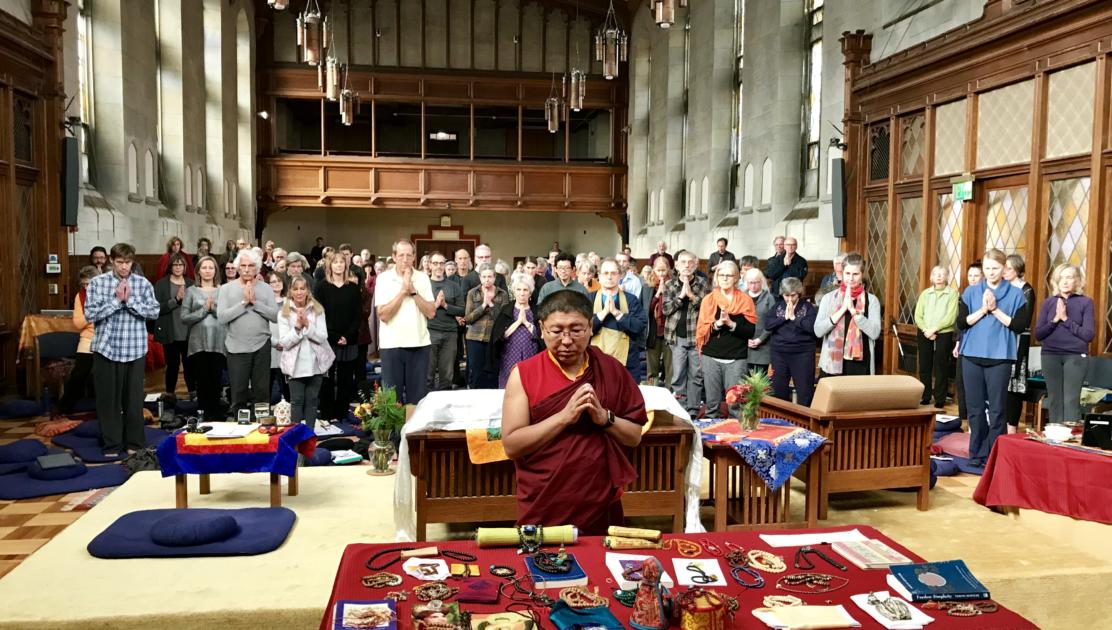Dreamlike Enlightenment
Tibetan Buddhist Teacher Tsoknyi Rinpoche Recently Led a Retreat at the Garrison Institute
By Scott TusaOn November 3, 120 participants gathered at Garrison Institute for a six-day silent retreat with Tsoknyi Rinpoche. The retreat, “Dreamlike Enlightenment: Understanding Illusion from a Dzogchen Perspective,” explored the intersections of a grounded sense of emotional well-being in the body, and the Dzogchen path of inner freedom through recognizing our own inner luminosity or rigpa. The teachings were both heart and mind opening, spanning a range of topics—including practices aimed at healing emotional wounds, how to develop meditative concentration, and how to find freedom within illusion through practices of Buddhist insight. Each day was a blend of teachings with Tsoknyi Rinpoche, group practice, and teaching recaps with me, Scott Tusa.
Tsoknyi Rinpoche is a lineage holder in both the Drukpa Kagyu and Nyingma traditions of Tibetan Buddhism. He was recognized by the 16th Karmapa as an emanation of the second Tsoknyi Rinpoche, a lama who continued out the activities of the first Drubwang Tsoknyi in heavily supporting female monastics in Eastern Tibet. Rinpoche’s early life was spent between Tashi Jong monastery in Northern India, where he received his main Buddhist education in the Drukpa Kagyu lineage, and time with his father Tulku Urgyen Rinpoche, and other well-known masters of the Nyingma tradition in Nepal. Rinpoche has been teaching worldwide for over 20 years, and has that rare ability to provide both the depth and wisdom of the Tibetan Buddhist tradition combined with the intimate knowledge needed to bridge the teachings with our modern lives. Even in a room full of students, he takes the time and care to meet each person exactly where they are, providing the insight needed to access more inner well-being and freedom. He is the author of three books: Open Heart, Open Mind; Carefree Dignity; and Fearless Simplicity. He also continues the work of his predecessors in supporting female monastics in Nepal and Tibet.
The retreat started with an exploration of Rinpoche’s unique healthy human being teachings and practices. These practices are aimed at reconnecting people to their own innate sense of essence-love, a quality of well-being and okayness in the body that is not based on excessive hope and fear or a subject-object centered love. Within our high-speed, highly objectifying society, many modern Buddhist practitioners also suffer from a lack of well-being, an issue that can easily be bypassed from within the bells and whistles of Tibetan Buddhism. By introducing the practice of handshaking, where we meet the feeling world with an awareness that fully feels rather than rejects, Rinpoche skillfully guided the retreat participants in how to be with challenging feelings in the body. Through reconnecting with the feeling world, one eventually begins to have access to one’s innate sense of essence-love, finding calmness in the body. Based on this, Rinpoche discussed developing meditative concentration by finding clarity in the mind, and sustaining that clarity through present moment awareness. Now entering the teachings on the Buddhist path of awakening and liberation, Rinpoche mainly taught from the Dzogchen tradition, where one seeks to gain familiarity with not-self and emptiness through the recognition of rigpa or nature of mind.
With the fall foliage on full display, the temperature dropped, making the Garrison Institute the perfect environment for diving deep into practice. The week also had a few wonderful surprises, with an impromptu talk by Daniel Goleman on science and meditation, and a wonderful guided meditation on lovingkindness by Sharon Salzberg. Throughout the retreat Rinpoche’s masterful command of Vajrayana Buddhism shined, and, as hearts opened, genuine transformation took place. Sometimes it is difficult to know how thirsty we really are until we come face to face with a vast refreshing pool of water. Six days went by so fast. By the end of the retreat, our hard shells softened, we were just starting to drink.
Scott Tusa is a Buddhist teacher based in Brooklyn, New York. He teaches meditation and Buddhist psychology nationally and supports Tsoknyi Rinpoche’s Pundarika Sangha as a practice advisor. He trained in Buddhist philosophy and meditation with some of the greatest living masters since his early twenties, including Lama Zopa Rinpoche, Tsoknyi Rinpoche, and Tulku Sangag Rinpoche. Ordained by His Holiness the Fourteenth Dalai Lama, he spent nine years as a Buddhist monk, with much of that time engaged in solitary meditation retreat and study in the United States, India, and Nepal. For more information please visit his website.
